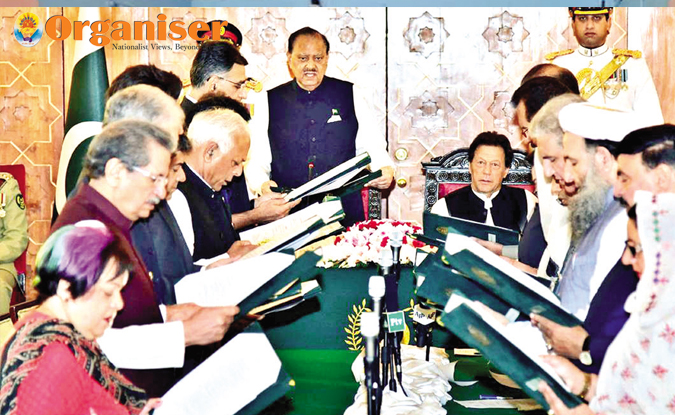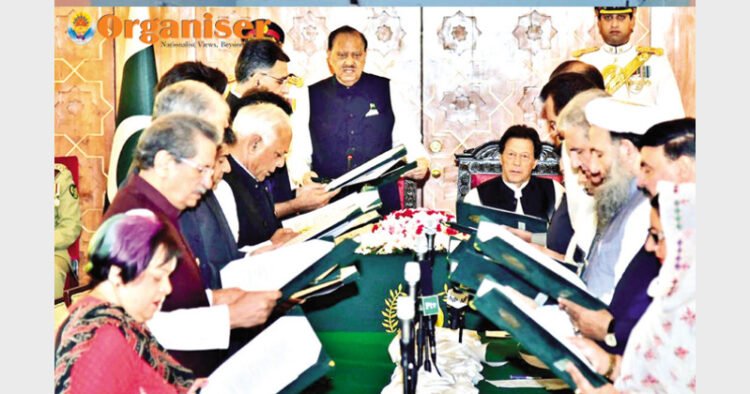New Pakistan PM Imran Khan’s Cabinet gives an idea of the return of Musharraf-era when Military-ruled with the fundamentalist forces in alliance
Santosh Verma
Imran Khan was sworn in as the Prime Minister of Pakistan on August 18, 2018. During this time, no need many politicians of different and many conflicting ideologies found refuge in this party. And on August 20, this “ideological diversity” was clearly seen in the oath-taking ceremony of Imran Khan’s newly formed Cabinet. In the 21-member Cabinet, 16 ministers and 5 advisers have been included. These include people of conflicting political and ideological backgrounds, and for them, the biggest form of equality can be that they were associate of former dictator General (retired) Parvez Musharraf and held important positions in the their reign.
Pakistan PM Imran Khan, centre right, looks on as the 21-member Cabinet takes oath
This Cabinet seems like the return of the Musharraf era. Support of the armed forces is the greatest contributor in the victory of Imran Khan, and in such a situation, it is natural that price might be paid by Imran. Pakistan’s army is strictly against any change which can be dangerous for its status. In this situation, the same feeling is reflected in the Cabinet. Most of the elected ministers include conservative figures like Sheikh Rashid, Dr Zubaida Jalal, Dr Khalid Maqbool, Dr Farog Naseem, Parvez Khattak and Shirin Mazari, who have nothing to do with the policy of change of PTI and any feelings like “new Pakistan” have not been reflected. Their main source of power is their relationship with the military establishment.
Canvas of Cabinet
In the cabinet where some Ministers and advisers are experts in their subjects, on the other hand, most of them do not have any special experience in this field, and it can be assumed that due to political requirements they are there. Mohammad Farog Naseem has been made Law and Justice Minister in this Cabinet. Barrister Naseem is a lawyer of constitutional law. He is the person who holds the post of youngest Advocate General of Sindh. Farogh is a part of the Muttahida Quami Movement (Pakistan), and the special thing is that he was also the legal advisor to former President Pervez Musharraf in the case of sedition.
In the new cabinet, not a single member of the minority communities of Pakistan has been included, not even for the Ministry of inter-faith harmonyIn the new cabinet, Parvez Khattak, who was the Chief Minister of Khyber Pakhtunkhwa from May 31, 2013, to June 6, 2018, is now sworn in as new Defence Minister. Khattak’s political journey started with the Pakistan People’s Party. As the Chief Minister of Khyber Pakhtunkhwa Khattak, he has been closely associated with fanatic Islamic parties in recent years. He has also provided a large number of funds to Darul Haqqaniya, which has been the centre of Taliban movement in recent years. He also made a political alliance with its patron Sami ul Haq’s political part Jamiyat Ulema-e-Islam- S, in these elections.
The Defence Minister does not have much work to do with his portfolio, because he lives entirely in the shadow of the Chief of Pakistan’s Army, which is the de facto supreme head. In such a situation, how Khattak cooperates with the army, who are fierce and quickly losing their temper, will be interesting to see.
Shah Mehmood Qureshi has been entrusted with the responsibility of Minister of External Affairs. It is notable that there was no “full time” Foreign Minister in the previous Nawaz Sharif Government. So, for a long time, the need for a “professional Foreign Minister” was being expressed. Qureshi has served as minister of state for parliamentary affairs from 1993 to 1996. During the 2008 Mumbai terror attacks, it was Qureshi in the People’s Party government who was the Foreign Minister of Pakistan during the sensitive period from 2008 to 2011. Although Qureshi used to “sympathise” with “India” which was in his words “anxious for justice” at the time, it was Qureshi who said during the same time that “We are fully prepared for war with India”.
In the new Cabinet, Asad Umar of PTI will work as the Minister of Finance, Revenue and Economic Affairs. Asad Umar is the son of former lieutenant general Mohammad Omar who was part of the Pakistan army during the 1971 war.
Women Included, Minorities Excluded
This time in Pakistan three women have been included in the cabinet. Unlike the prevailing traditions, this time a woman has been made Minister of Defense Production. Zubaida Jalal associated with the Balochistan Awami Party has made history after becoming the only woman candidate from Balochistan for the National Assembly. It is notable that Jalal has also worked as the Minister of Federal Education in Prime Minister Shaukat Aziz’s Cabinet. Zubaida Jalal was presented as the most enlightened face of General Pervez Musharraf’s rule. Her sense of loyalty towards Musharraf can be judged from the fact that in 2008, she publicly supported Musharraf during a high time of campaigns against Musharraf. In a television interview, Zubaida Jalal had said that as a brave and courageous leader, Pervez Musharraf will always be “in Pakistan” and “for Pakistan”.
In the new Cabinet, not a single member of the minority communities of Pakistan has been included, not even for the Ministry of inter-faith harmony. Not a single Hindu, Christian or Parsi name was considered. Dr Fhemeida Mirza is being treated abroad due to her serious health condition. In such a situation, she will be able to discharge her responsibilities; it is doubtful. Tariq Bashir Cheema is a conservative Punjabi politician of Bahawalpur who has been made Minister of the States and Frontier Sector. But his knowledge and understanding about tribal areas is almost zero. An army favourite like Shirin Mazari has been made minister to protect the human rights of Pakistan, which is ridiculous. In the past, Ministers of this ministry were having a bitter relationship. In the midst of all of these “how the cabinet works” as a “team”, it can be a great matter of concern for Imran Khan!
(The writer is a researcher and regularly observes Pakistan media)















Comments